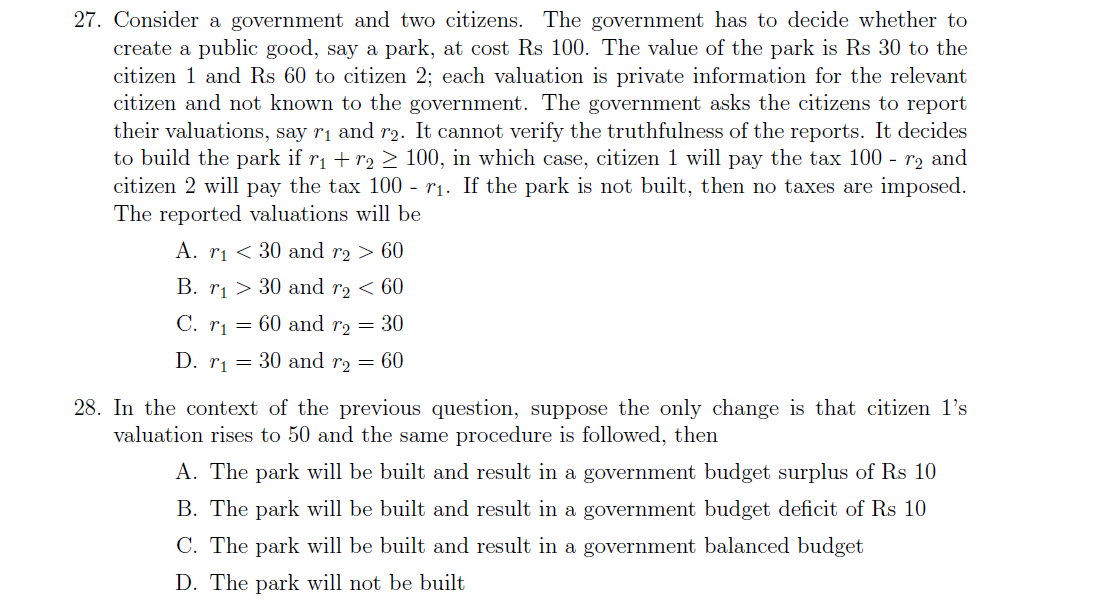27. Consider a government and two citizens. The government has to decide whether to create a public good, say a park, at cost Rs 100. The value of the park is Rs 30 to the citizen 1 and Rs 60 to citizen 2; each valuation is private information for the relevant citizen and not known to the government. The government asks the citizens to report their valuations, say rị and r2. It cannot verify the truthfulness of the reports. It decides to build the park if r1 + r2 > 100, in which case, citizen 1 will pay the tax 100 - r2 and citizen 2 will pay the tax 100 - r1. If the park is not built, then no taxes are imposed. The reported valuations will be A. rị < 30 and r2 > 60 B. r1 > 30 and r2 < 60 C. r1 = 60 and r2 = 30 D. rị = 30 and r2 60 28. In the context of the previous question, suppose the only change is that citizen 1's valuation rises to 50 and the same procedure is followed, then A. The park will be built and result in a government budget surplus of Rs 10 B. The park will be built and result in a government budget deficit of Rs 10 C. The park will be built and result in a government balanced budget D. The park will not be built
27. Consider a government and two citizens. The government has to decide whether to create a public good, say a park, at cost Rs 100. The value of the park is Rs 30 to the citizen 1 and Rs 60 to citizen 2; each valuation is private information for the relevant citizen and not known to the government. The government asks the citizens to report their valuations, say rị and r2. It cannot verify the truthfulness of the reports. It decides to build the park if r1 + r2 > 100, in which case, citizen 1 will pay the tax 100 - r2 and citizen 2 will pay the tax 100 - r1. If the park is not built, then no taxes are imposed. The reported valuations will be A. rị < 30 and r2 > 60 B. r1 > 30 and r2 < 60 C. r1 = 60 and r2 = 30 D. rị = 30 and r2 60 28. In the context of the previous question, suppose the only change is that citizen 1's valuation rises to 50 and the same procedure is followed, then A. The park will be built and result in a government budget surplus of Rs 10 B. The park will be built and result in a government budget deficit of Rs 10 C. The park will be built and result in a government balanced budget D. The park will not be built
Principles of Microeconomics
7th Edition
ISBN:9781305156050
Author:N. Gregory Mankiw
Publisher:N. Gregory Mankiw
Chapter11: Public Goods And Common Resources
Section: Chapter Questions
Problem 2PA
Related questions
Question
The question is attached in the image below. The correct answers are D and B respectively.
Please solve both the questions. Thank you.

Transcribed Image Text:27. Consider a government and two citizens. The government has to decide whether to
create a public good, say a park, at cost Rs 100. The value of the park is Rs 30 to the
citizen 1 and Rs 60 to citizen 2; each valuation is private information for the relevant
citizen and not known to the government. The government asks the citizens to report
their valuations, say r1 and r2. It cannot verify the truthfulness of the reports. It decides
to build the park if r1 + r2 > 100, in which case, citizen 1 will pay the tax 100 - r2 and
citizen 2 will pay the tax 100 - rị. If the park is not built, then no taxes are imposed.
The reported valuations will be
A. ri < 30 and r2 > 60
B. r1 > 30 and r2 < 60
C. r1 = 60 and r2 = 30
D. rj = 30 and rɔ = 60
28. In the context of the previous question, suppose the only change is that citizen 1's
valuation rises to 50 and the same procedure is followed, then
A. The park will be built and result in a government budget surplus of Rs 10
B. The park will be built and result in a government budget deficit of Rs 10
C. The park will be built and result in a government balanced budget
D. The park will not be built
Expert Solution
This question has been solved!
Explore an expertly crafted, step-by-step solution for a thorough understanding of key concepts.
Step by step
Solved in 3 steps

Knowledge Booster
Learn more about
Need a deep-dive on the concept behind this application? Look no further. Learn more about this topic, economics and related others by exploring similar questions and additional content below.Recommended textbooks for you

Principles of Microeconomics
Economics
ISBN:
9781305156050
Author:
N. Gregory Mankiw
Publisher:
Cengage Learning

Essentials of Economics (MindTap Course List)
Economics
ISBN:
9781337091992
Author:
N. Gregory Mankiw
Publisher:
Cengage Learning

Principles of Microeconomics (MindTap Course List)
Economics
ISBN:
9781305971493
Author:
N. Gregory Mankiw
Publisher:
Cengage Learning

Principles of Microeconomics
Economics
ISBN:
9781305156050
Author:
N. Gregory Mankiw
Publisher:
Cengage Learning

Essentials of Economics (MindTap Course List)
Economics
ISBN:
9781337091992
Author:
N. Gregory Mankiw
Publisher:
Cengage Learning

Principles of Microeconomics (MindTap Course List)
Economics
ISBN:
9781305971493
Author:
N. Gregory Mankiw
Publisher:
Cengage Learning

Principles of Economics (MindTap Course List)
Economics
ISBN:
9781305585126
Author:
N. Gregory Mankiw
Publisher:
Cengage Learning

Principles of Economics, 7th Edition (MindTap Cou…
Economics
ISBN:
9781285165875
Author:
N. Gregory Mankiw
Publisher:
Cengage Learning

Principles of Economics 2e
Economics
ISBN:
9781947172364
Author:
Steven A. Greenlaw; David Shapiro
Publisher:
OpenStax